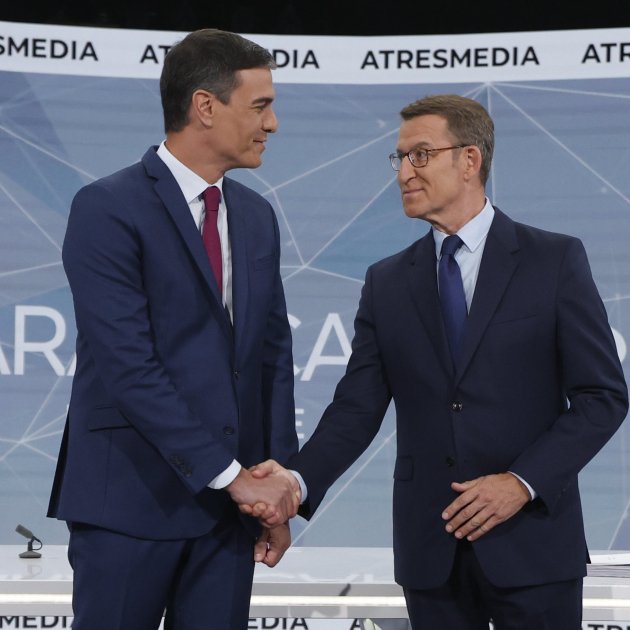A victory that fell short. Alberto Núñez Feijóo has won the Spanish general election of 23rd July, but the possibility of reaching the Moncloa government palace seems to have slipped through his hands. Feijóo's People's Party (PP), with 136 MPs, and Vox, with 33, have failed to win sufficient seats and thus are unable to govern Spain during the next legislature. Since an absolute majority in the lower house requires 176 seats, the votes of minor parties Coalición Canaria (1) and Unión del Pueblo Navarro (1) are not going to be enough to make Feijóo prime minister of Spain. Despite winning 47 more seats than in 2019 and becoming - narrowly - the most voted party in the state, the PP does not have enough with the support of a weakened Vox. The dream of returning to the Moncloa faded during a knife-edge vote count, which was not decided until the end. The Madrid headquarters of the two main Spanish parties both experienced a rollercoaster of emotions.
On the other side of the coin, Pedro Sánchez does have the possibility of remaining in the prime ministerial seat. However, it will not be easy at all, and a deadlock scenario could occur leading to a repeat general election. The PSOE's 122 seats, added to the 31 won by Sumar, yield a total of 153. And, if they manage to convince the Catalan Republican Left (ERC) (7), the Basque parties EH Bildu (6) and the PNV (5) and the Galicians BNG (1), they would have a total of 172 votes secured for the investiture. But it will be Sánchez's turn to sweat, as he will then have to convince Together for Catalonia (Junts) to abstain if he wants to remain Spanish PM. This would allow him to lose the first investiture vote, for which the absolute majorityof 176 votes is needed, but to win the second, where it is only necessary to obtain a simple majority, that is to say, more positive votes than negative. And thus to govern.
At the end of the day, the final result is a draw, if you take into account the possible allies who have preference for Sánchez or Feijóo to lead the government. The right-wing bloc won 169 seats. All the other parties have already announced that they would prefer a Spanish government presided over by the Socialists than by the PP, let alone a PP coalition with Vox. The Basque Nationalist Party (PNV), for example, had opened itself to vote in Feijóo as PM, but always asking that the extreme right be left out of the equation. On the other hand, PSOE, Sumar, ERC, Bildu, PNV and BNG add up to 172 deputies, just one more than the other bloc. The result of 23rd July, then, puts the focus on the pro-independence Junts, which until now has reiterated that they will have nothing to do with choosing a Spanish PM who does not accept a referendum on self-determination in Catalonia. The investiture will thus pass through the capital of Catalan exile: Waterloo.
The votecount: a rollercoaster
The night at PSOE headquarters began with excitement. Even though the polls published at the close of the polling stations showed a similar picture to that of the survey published during the previous weeks, the first partial vote counts turned the score upside down. The PSOE was well ahead of the PP as the first results came in. And, suddenly, the PP went from being the favourites to win to possible electoral also-rans.
With the election day polls, the spokesperson for the Socialist executive, Pilar Alegría, called for "maximum caution". Not only was the result inconclusive, it was just a poll. Everything started to change after the closing of the Canary Island polling stations at 9pm, when the actual vote counts began to be reported. Socialists headquarters started to go crazy, and throughout the building you could hear the shouts of celebration from the party leadership every time a red seat was added to the scoreboard.
The PP takes the satisfaction of having finished first in a general election again seven years later after its 2016 win, but the numbers don't add up despite the first signs being promising. At the PP base, on Calle Génova in Madrid, there was a good mood after learning the results of the TV3 survey. The party's general secretary, Cuca Gamarra, appeared with a smile on her face, almost taking victory for granted. "The PP will regain the position of the leading force in a general election", she said, even admitting that Feijóo would be the next prime minister of Spain. The fact is that the expectations of the PP were high because the party's analysis saw the victory almost in the bag, placing it at the fugure of 150 deputies, which is what the survey of the public television networks indicated.
The Feijóo team waited until the last moment before finally admitting that it would be very difficult for them to return to the Moncloa government palace. The hopefulness among the Spanish conservatives faded as the count progressed. It had painted a very close race from the beginning of the night, unlike the majority of polls that had been published up to that point. Little by little, as the vote count went on, the smiles fell away.
